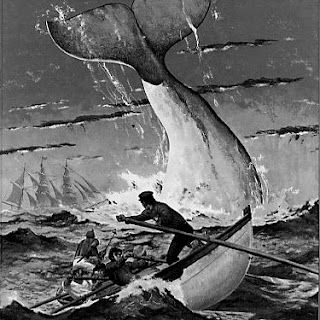 But the utmost proof I can provide is stored deep within you, though you know it not. Every shred, every tatter of self-loathing, of humiliation, of despair redounds to the curses of your creator. Man is not an instantaneous, unspawned hater of others, but was made in the image of another. Life is not so bleak! We are not without precedent, alone in this world; our actions are validated and confirmed by the actions of our maker. Not for nothing were we made weak, and jealous and wrathful, and not for nothing does everyman seek to improve his lot by shedding the blood of his neighbour.
But the utmost proof I can provide is stored deep within you, though you know it not. Every shred, every tatter of self-loathing, of humiliation, of despair redounds to the curses of your creator. Man is not an instantaneous, unspawned hater of others, but was made in the image of another. Life is not so bleak! We are not without precedent, alone in this world; our actions are validated and confirmed by the actions of our maker. Not for nothing were we made weak, and jealous and wrathful, and not for nothing does everyman seek to improve his lot by shedding the blood of his neighbour.A quasi-literary blog: book reviews in modern and classic fiction, occasional original stories and frequent pontification. Come on in.
- For Whom the Bell Tolls
Tuesday, 30 November 2010
Ahab's Philosophy
 But the utmost proof I can provide is stored deep within you, though you know it not. Every shred, every tatter of self-loathing, of humiliation, of despair redounds to the curses of your creator. Man is not an instantaneous, unspawned hater of others, but was made in the image of another. Life is not so bleak! We are not without precedent, alone in this world; our actions are validated and confirmed by the actions of our maker. Not for nothing were we made weak, and jealous and wrathful, and not for nothing does everyman seek to improve his lot by shedding the blood of his neighbour.
But the utmost proof I can provide is stored deep within you, though you know it not. Every shred, every tatter of self-loathing, of humiliation, of despair redounds to the curses of your creator. Man is not an instantaneous, unspawned hater of others, but was made in the image of another. Life is not so bleak! We are not without precedent, alone in this world; our actions are validated and confirmed by the actions of our maker. Not for nothing were we made weak, and jealous and wrathful, and not for nothing does everyman seek to improve his lot by shedding the blood of his neighbour.Tuesday, 23 November 2010
Melville and I
Thursday, 18 November 2010
A Hand-Made Tale
Friday, 12 November 2010
Autopeotomy and the OED
A brief foray into non-fiction.
Simon Winchester’s The Surgeon of Crowthorne is the history of a former US army surgeon imprisoned in Broadmoor lunatic asylum, near Crowthorne, in the late nineteenth century. It charts his involvement with the creation of the first edition of the Oxford English Dictionary, which was compiled with the help of hundreds of volunteers throughout the English-speaking world who read obscure books and sent in little slips of paper with words and quotations illustrating their meanings. The surgeon, Dr Minor, was imprisoned after he killed a man in Lambeth whilst suffering from one of his periodic, almost nightly, bouts of delusion. From his asylum cell, lined with his many books, he begins a correspondence with the editor of the OED that will last twenty years and will prove him to be one of the most meticulous and productive of the many volunteers involved in the project.
The subject matter, a murder in smoggy Victorian London and the severe conditions of a nineteenth-century lunatic asylum, are enough to make Edgar Allen Poe salivate. The story hinges on the tension between Minor’s insanity – he is convinced that he endures nightly persecution by would-be assassins who emerge from the floorboards to drug, torture and sexually abuse him – and the evident lucidity of his work on the dictionary. It is told well, with a verbosity that suits the bookish subject matter, and leaves one’s own vocabulary enhanced (see title, a late twist in Dr Minor’s already grim saga).
As with all such books – and to continue on from the previous post on Burgess – it suffers from what I perceive to be a problem. Some of the facts are clearly verifiable, and the author acknowledges his debts to many documents, institutional registers and the like. But some are obviously the product of artistic license, and this bothers me. Either write a history, or write a novel. I might sound a bit militant here, but I am a historian by training. On the back of the book, it is described as a ‘classic work of detection’. Very noncommittal. But Winchester does intersperse his narrative with enough perhapses and maybes to let us know that he is filling in a number of gaps. He is being honest, at least.
I sound very snobbish about this, I know. I enjoy a book that meddles with the line between fiction and reality, but I think I only enjoy this in a fictional context. Hopefully somewhere out there is a semi-history or a historical novel that can persuade me to take the plunge off my high horse, but I’m not quite there yet.